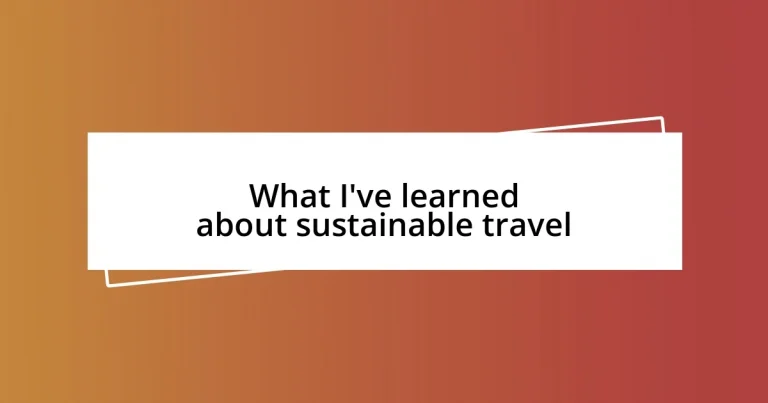Key takeaways:
- Sustainable travel involves reducing environmental impact and enriching local communities through informed travel choices, including local transportation and accommodations.
- Supporting local economies and respecting cultures enhances travel experiences while preserving traditions, exemplified by dining at family-run restaurants and engaging local guides.
- Engaging responsibly with wildlife and participating in conservation activities deepen connections with nature, highlighting the importance of ethical tourism practices.

Understanding sustainable travel concepts
Sustainable travel is more than just a buzzword; it embodies an approach focused on minimizing our environmental impact while enriching local communities. I still remember my visit to an eco-lodge in Costa Rica, where I witnessed firsthand how the establishment worked hand-in-hand with indigenous communities. It made me ponder: how can our travel choices uplift the places we explore rather than exploit them?
I’ve learned that understanding sustainable travel begins with recognizing our responsibility as travelers. This awareness shaped my decision to opt for local transportation instead of relying on cars or planes, really transforming how I connect with a place. Have you ever considered how taking a bus or biking instead of flying can change your perspective on travel? I’ve found that these choices often lead to unexpected adventures and deeper interactions with locals.
The concept also emphasizes the importance of conservation and respecting wildlife. While visiting a national park, I noticed how carefully the guides educated us on maintaining their delicate ecosystems. It’s a heartwarming feeling to see how our involvement supports these efforts; isn’t it inspiring to think that our travels can contribute to protecting the very beauty we seek?
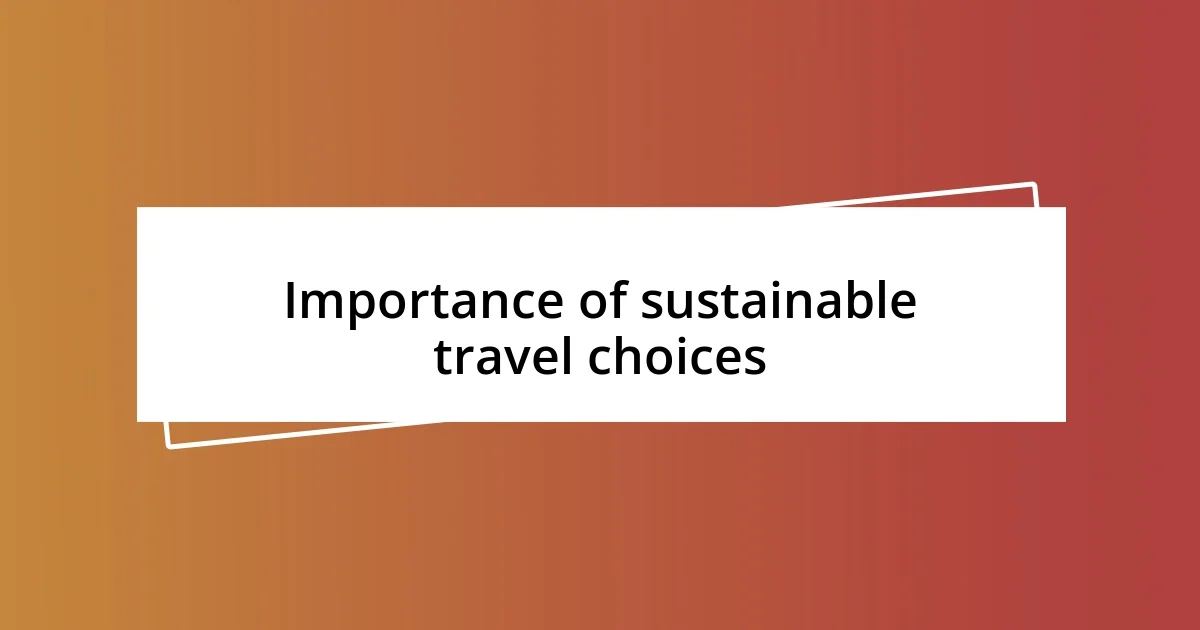
Importance of sustainable travel choices
Making sustainable travel choices is crucial not just for the environment, but for the communities we visit. I remember exploring a small village in Thailand where the local economy thrived on tourism that respected their culture. It struck me then how our decisions can empower people rather than overwhelm them. Choosing to stay in locally-owned accommodations and eating at family-run restaurants not only comes with the added benefit of authentic experiences but also helps keep the community vibrant.
Here are some key benefits of making sustainable travel choices:
- Protecting natural resources: Sustainable practices help preserve ecosystems and wildlife, ensuring that destinations remain beautiful for generations.
- Supporting local economies: Spending money on local businesses strengthens communities and provides livelihoods to residents.
- Cultural preservation: Engaging with authentic experiences helps maintain the unique traditions and cultures of destinations.
- Personal fulfillment: Conscious choices often lead to richer and more meaningful travel experiences, creating lasting memories.
- Reducing carbon footprints: Opting for eco-friendly transport and accommodations can significantly minimize our impact on the planet.
It’s enlightening to see how small changes in our travel habits can lead to substantial positive outcomes. Have you ever felt that sense of connection knowing you were part of something greater during your travels?

Practical tips for eco-friendly packing
Packing for a sustainable trip can make a significant difference in reducing your environmental impact. When I travel, I always prioritize reusable bags. Not only are they sturdier than plastic ones, but they also allow me to be organized and prevent waste. I recall landing in a bustling city and realizing I forgot a reusable water bottle; it was a lesson on how a small item can make a big difference in waste reduction.
Another tip is to choose multi-purpose clothing made from sustainable fabrics. When I packed for my last hiking trip, I opted for garments that could transition from a day in nature to an evening out. This not only saved space in my luggage, but also reduced my overall consumption, proving that minimalism can be not just stylish, but also eco-friendly.
Lastly, consider the essentials to include in your eco-pack. Biodegradable toiletries and solid soap bars have become staples in my travel kit. They’re lightweight and diminish plastic pollution while keeping me fresh. I remember feeling empowered knowing my small choices were contributing towards a larger goal of sustainability each time I travel.
| Item | Eco-Friendly Option |
|---|---|
| Plastic bags | Reusable cloth bags |
| Standard clothing | Sustainable multi-purpose clothing |
| Liquid toiletries | Solid toiletries and biodegradable options |
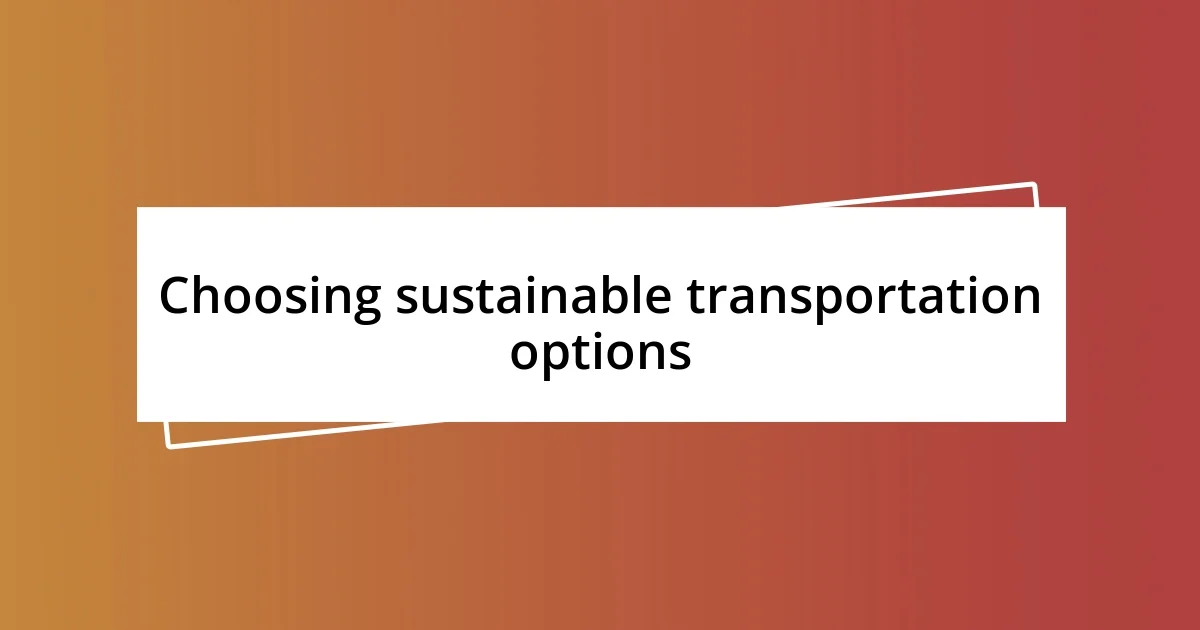
Choosing sustainable transportation options
Choosing sustainable transportation options is a vital aspect of my travel experiences. I always opt for public transit whenever possible, like the time I rode the tram in Prague. It was not just a convenient choice; the views from the window turned my daily commute into a scenic adventure, helping me connect with the local vibe. Have you ever noticed how a train journey can feel like a mini-exploration of its own?
I find that walking or cycling offers unparalleled joy. During a recent trip to Amsterdam, I decided to rent a bike rather than take a taxi. It allowed me to discover hidden gems, like quaint cafés and flower markets, while enjoying the crisp air. There’s something intimate about experiencing a city at a slower pace, don’t you think?
When flying is unavoidable, I make it a point to choose airlines that prioritize sustainability. On one of my trips, I selected an airline committed to reducing carbon emissions through various initiatives. It felt rewarding knowing my travel choices were aligned with a greener philosophy. Every action counts, and I often wonder how simply choosing an eco-conscious airline can ripple out to create larger environmental impacts.
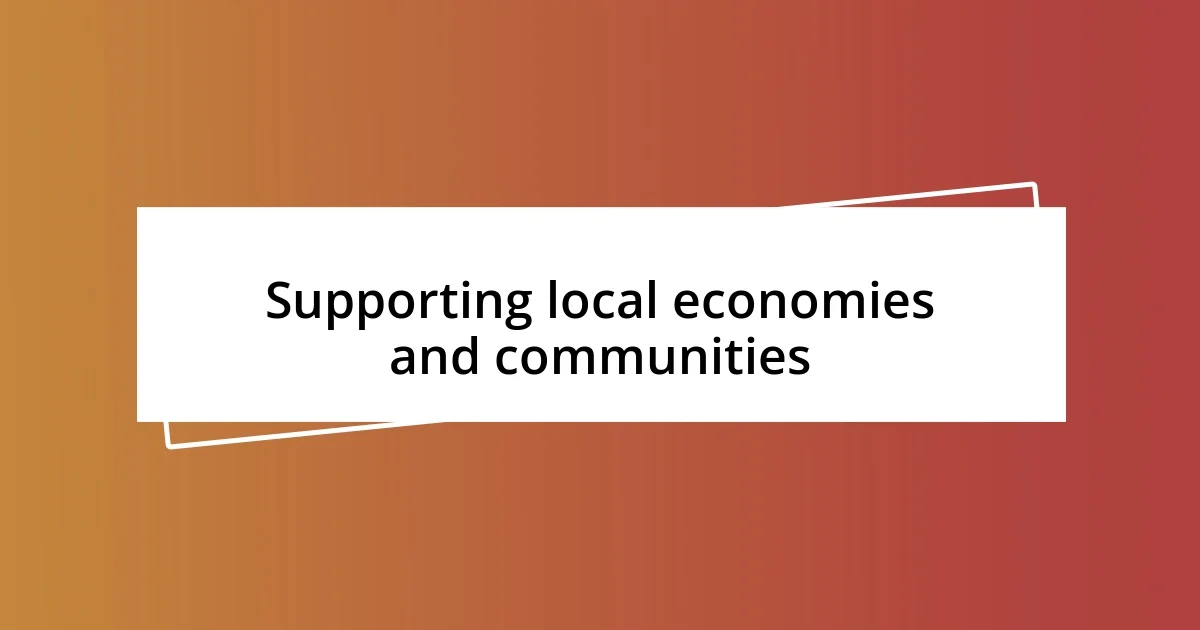
Supporting local economies and communities
Supporting local economies and communities adds a rich layer to the travel experience. I remember strolling through a vibrant market in Mexico, where each artisan proudly shared the stories behind their crafts. Not only was I buying unique souvenirs, but I was also directly contributing to the livelihoods of these talented individuals. Isn’t it amazing how a simple purchase can create meaningful connections and support local families?
Eating at local restaurants instead of chain establishments is another way I love to support communities. On a trip to Italy, I took a chance on a family-run trattoria tucked away from the tourist crowds. The homemade pasta and warm hospitality made for one of my most memorable meals. Each bite was infused with the culture and passion of the owners, reminding me of the power of local flavors to enrich our travels. Why settle for generic when you can have a slice of authenticity?
Lastly, I actively seek experiences led by local guides when exploring new destinations. During a trekking trip in Nepal, having a local guide transformed my journey. His insights about the culture and environment deepened my appreciation for the majestic landscape. I often reflect on how these connections not only provide economic benefits but also foster a deeper understanding of the places we visit. Don’t you think that embracing local perspectives can truly elevate our travel experiences?
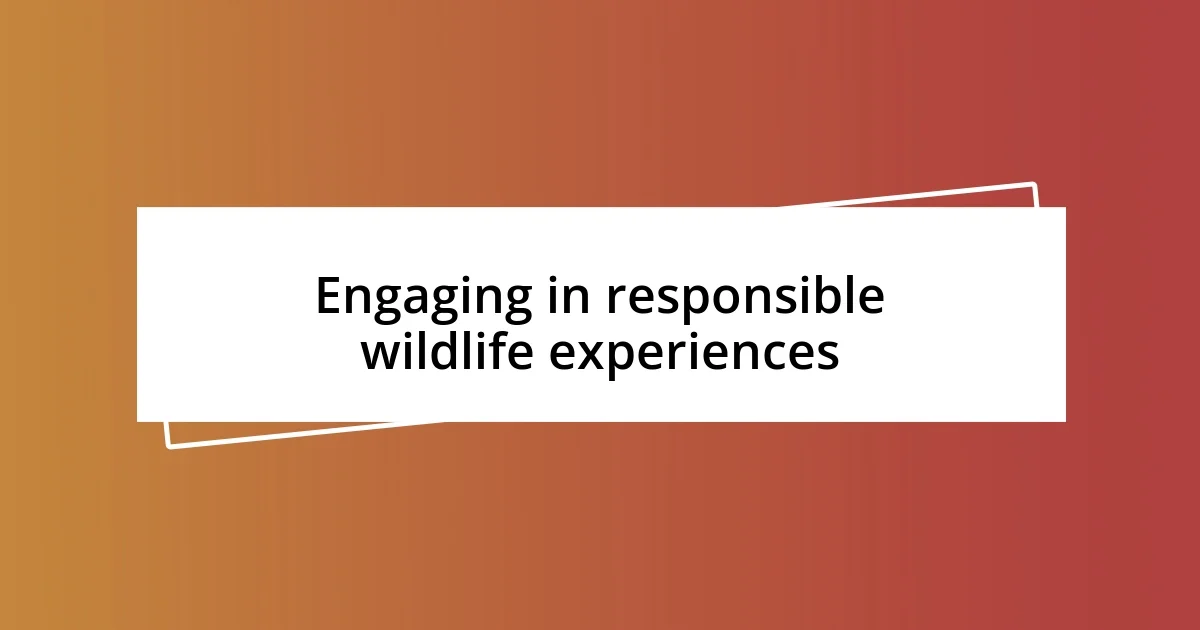
Engaging in responsible wildlife experiences
Engaging in responsible wildlife experiences is a powerful way to connect with nature while respecting the animals that inhabit it. On a visit to a wildlife reserve in South Africa, I chose a guided tour that emphasized responsible viewing practices. I stood in awe as elephants roamed freely while being mindful of the distance we kept, ensuring their comfort. Doesn’t it feel incredible to witness such majestic creatures without intruding on their natural behaviors?
I also avoid activities that exploit animals, such as elephant rides or photo ops with sedated wildlife. Instead, I seek out sanctuaries that prioritize rehabilitation and education. During a trip to Thailand, I visited a sanctuary for rescued elephants, where I learned about their stories and the importance of conservation. The heartfelt interactions with the elephants, while keeping their welfare at the forefront, made me realize how responsible tourism can aid in preserving these magnificent animals. Have you ever thought about how our choices can either uplift wildlife or contribute to their suffering?
Moreover, participating in conservation activities during trips adds another layer of engagement. I once joined a beach clean-up in Costa Rica, where I met passionate locals dedicated to protecting sea turtles. The experience left me inspired and connected to a larger mission. It made me appreciate how even small efforts can lead to significant differences in wildlife preservation. What if every traveler contributed a bit of their time toward protecting our planet’s natural beauty?

Offsetting your carbon footprint effectively
Offsetting your carbon footprint effectively involves more than just planting trees. I fondly remember my experience during a flight where I had the option to donate to a carbon offset program. With each contribution, I imagined a newly planted sapling growing into a mighty oak, helping to absorb the carbon produced during my travels. Have you considered how your small contribution can lead to big changes?
Participating in credible offset programs can make a significant difference. I once chose a project focused on renewable energy in a developing country, and it felt empowering knowing my travel habits were supporting solar initiatives. Just think about it: by funding such projects, we’re not only reducing emissions but also improving quality of life for communities that rely on clean energy. Isn’t it rewarding to know your actions have a ripple effect?
Lastly, I believe it’s crucial to stay informed and choose offsets that resonate with your values. When I researched projects, I found one that focused on habitat restoration, which aligned with my passion for nature. Picture this: every dollar spent, every flight taken, could be contributing to a thriving ecosystem. What could be more fulfilling than being a part of something larger, smoothing the carbon trail we leave behind?












